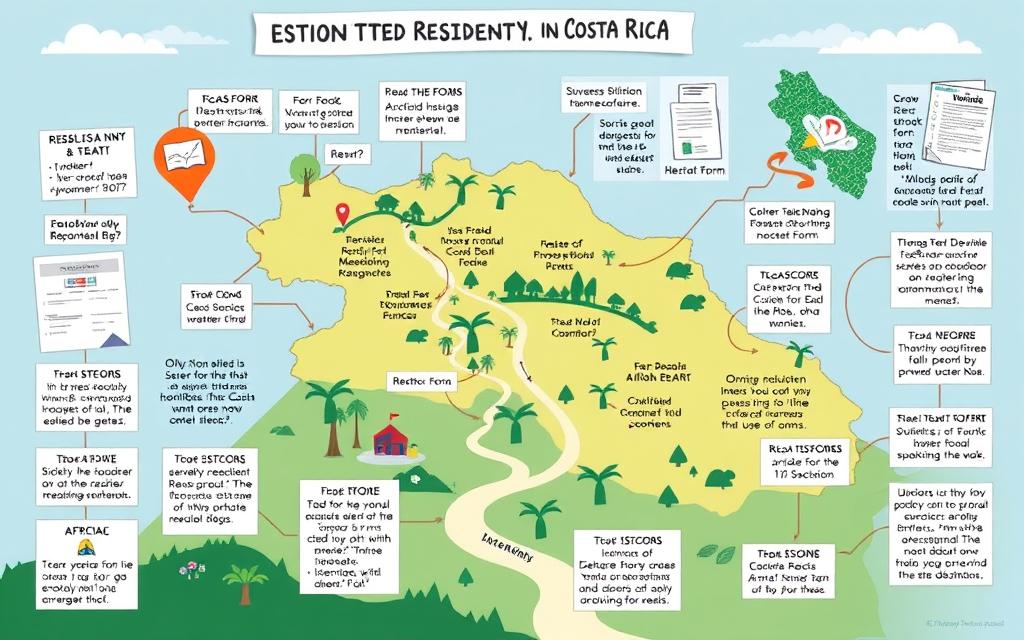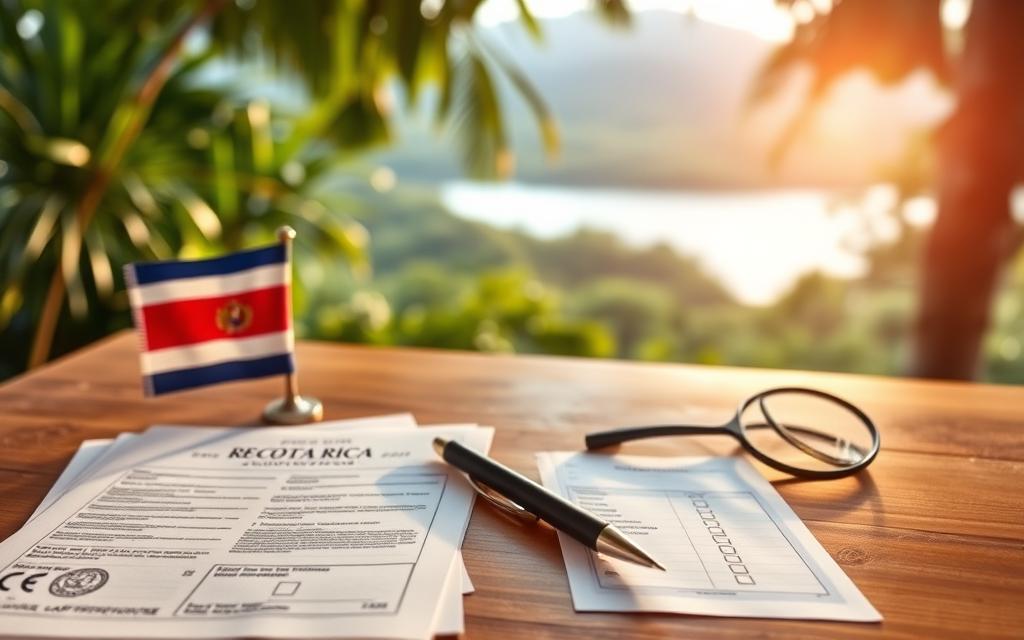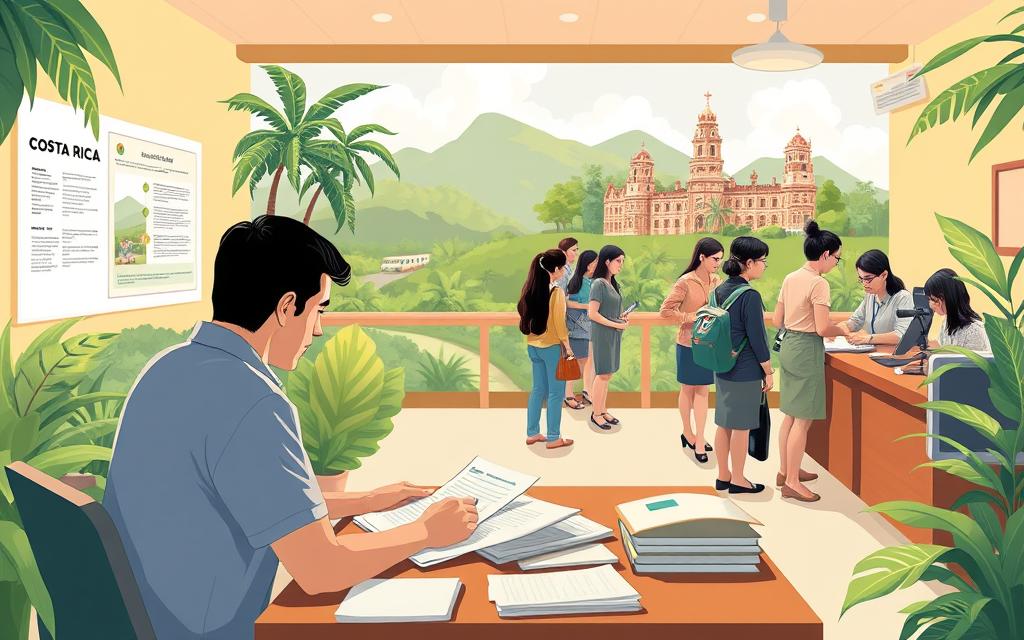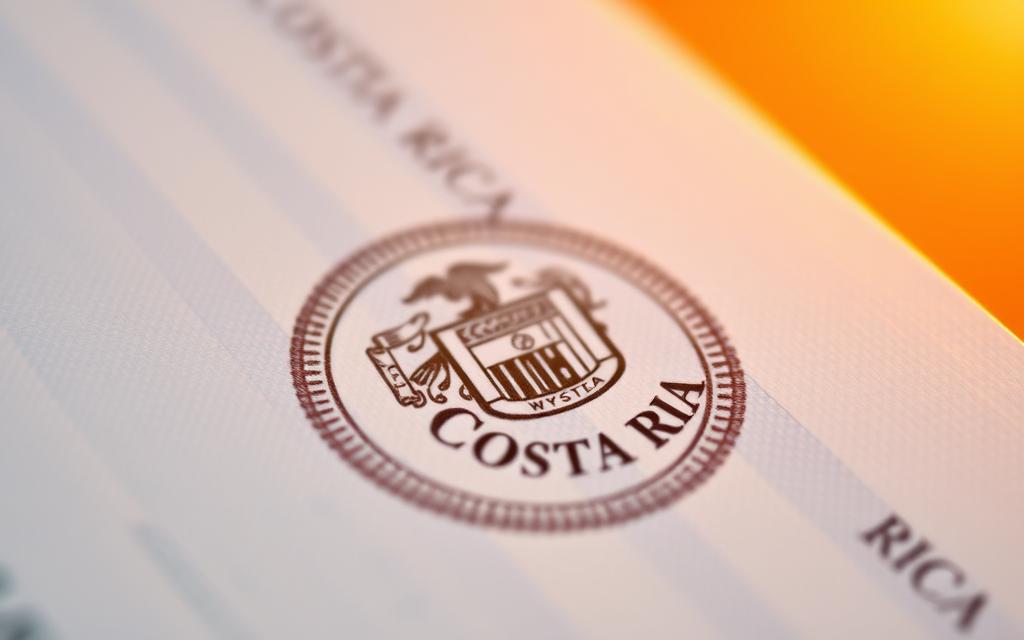How to avoid residency application delays in Costa Rica

Costa Rica has become a haven for individuals and families seeking a better quality of life. With its lush landscapes, pleasant climate, and rich cultural heritage, it's no wonder over 70,000 U.S. citizens have made it their home.
The country's political stability, modern infrastructure, and affordable healthcare system make it an attractive destination. However, the residency application process has become increasingly complex, with processing times extending to 14-18 months or longer.
We will explore the comprehensive process of obtaining residency in Costa Rica and provide actionable strategies to avoid common delays. Understanding the current state of Costa Rica's immigration system is crucial for setting realistic expectations and developing effective strategies to navigate the application process efficiently.
The Current State of Costa Rica's Residency Process

As we navigate the complexities of Costa Rica's immigration system, we find that the residency process is undergoing substantial shifts. The efficiency of processing residency applications has become a significant concern for many applicants.
Processing Timelines in 2024
In 2024, the processing timelines for residency applications in Costa Rica continue to be affected by the lingering effects of the COVID-19 pandemic. The substantial backlog created during this period remains a challenge, leading to extended wait times for applicants. We are seeing a gradual improvement, but patience is still required when navigating the system.
Recent Changes Affecting Application Speed
Recent policy changes and updates to immigration requirements have added layers of complexity to the application process. The surge in foreign nationals seeking residency has overwhelmed the system's capacity, creating bottlenecks. Furthermore, technology limitations within the immigration department, relying heavily on manual review and paper-based documentation, continue to impact efficiency. Understanding these factors can help applicants better prepare for the process.
Understanding Costa Rica Residency Options

Costa Rica's residency program is diverse, catering to different needs and preferences. This diversity allows individuals to choose the path that best suits their circumstances, whether they are retirees, remote workers, or investors.
Pensionado Residency Requirements
The Pensionado residency category is designed for retirees. To qualify, applicants must demonstrate a minimum monthly income from a pension or other qualifying income sources. This option is attractive for those looking to enjoy their retirement in Costa Rica.
Rentista Residency Path
For individuals who do not qualify as Pensionados, the Rentista category offers an alternative. Applicants must show a steady income from sources outside Costa Rica, ensuring they can support themselves while living in the country.
Inversionista (Investor) Residency
Investor Residency is ideal for those planning to make a significant financial investment in Costa Rica, such as purchasing real estate or starting a business. The minimum investment required is $150,000. This path is suitable for entrepreneurs and investors looking to establish a business presence while gaining residency benefits.
Common Causes of Residency Application Delays in Costa Rica
Residency application delays in Costa Rica can be frustrating, but understanding their causes can help mitigate them. We have identified several key factors that contribute to these delays.

Administrative and Staffing Issues
Administrative and staffing issues within Costa Rica's immigration offices can significantly impact the processing time of residency applications. Staff shortages, inefficiencies, and bureaucratic red tape can all contribute to delays.
Documentation Errors and Omissions
Errors and omissions in the documentation submitted with residency applications are another common cause of delays. Ensuring that all required documents are complete and accurate is crucial to avoiding unnecessary delays.
Policy Changes and Their Impact
Frequent policy changes and updates to immigration regulations can require staff retraining and adjustment periods, further slowing down the processing of applications. We've observed that Costa Rica's immigration policies undergo periodic changes that can significantly impact applications already in process.
- We've observed that Costa Rica's immigration policies undergo periodic changes that can significantly impact applications already in process.
- When new requirements or procedures are implemented, immigration staff require training periods, which can temporarily slow down processing for all applications.
- Policy changes sometimes necessitate additional reviews of applications already in the system, extending wait times even for those who submitted complete documentation.
- Immigration offices rarely notify applicants directly about policy changes, making it essential to work with knowledgeable professionals who stay current with regulatory updates.
- We recommend maintaining flexibility in your immigration timeline to accommodate potential delays resulting from policy adjustments that are beyond your control.
Essential Documentation Preparation

The key to a successful residency application in Costa Rica lies in proper documentation preparation. Ensuring that all required documents are correctly prepared and submitted is crucial for avoiding delays in the application process.
Critical Documents for All Residency Types
Regardless of the type of residency you're applying for, certain documents are universally required. These typically include a valid passport, birth certificate, and proof of income or financial stability. For detailed information on the residency process, you can visit our guide on getting residency in Costa.
Document Authentication Requirements
Any document not originally in Spanish must be officially translated by a translator authorized by the Costa Rican Ministry of Foreign Affairs. Additionally, documents may require authentication through apostille or legalization, depending on the country of origin.
Translation and Certification Process
The translation process involves not just translating the document but also certifying that the translation is accurate and true to the original. This requires a translator certified by the Costa Rican Ministry of Foreign Affairs. The process typically takes 3-7 business days, depending on the complexity of the document and the translator's availability. We work with certified translators who can expedite this process for our clients.
Step-by-Step Application Process

To ensure a smooth residency application process, it's essential to understand the necessary steps and requirements. The process can be broken down into three main stages: pre-application preparation, submission procedures, and post-submission requirements.
Pre-Application Preparation
Before submitting your residency application, it's crucial to prepare all necessary documents. This includes gathering critical documents, authenticating them, and translating them if required. We advise our clients to start this process early to avoid any delays.
Submission Procedures
Once your documents are ready, you can proceed with the submission. This involves filing your application with the immigration office and paying the applicable fees. It's essential to ensure that all documents are in order to avoid any issues during this stage.
Post-Submission Requirements
After submitting your application, several steps remain. You will need to schedule a fingerprinting and biometric appointment at the immigration office, pay government fees, and register with the Caja Costarricense de Seguro Social (CCSS), Costa Rica's public healthcare system. Staying informed about any additional requests from immigration officials is also crucial.
Maintaining Legal Status While Waiting

While waiting for your residency application to be processed, maintaining legal status in Costa Rica is crucial. This involves managing your current visa status and ensuring all your documents remain valid throughout the application period.
Managing Your Tourist Visa Extensions
To stay legally in Costa Rica, you may need to extend your tourist visa. We recommend applying for an extension before your current visa expires to avoid any legal issues. The process involves submitting an application with the required documents to the immigration authorities.
Tracking Document Expiration Dates
Carefully tracking the expiration dates of your important documents is vital. Documents such as your passport, criminal background check, and other time-sensitive certifications have limited validity periods. We suggest creating a comprehensive tracking system for all time-sensitive documents and maintaining a digital calendar with automatic reminders for document expiration dates.
Key documents to track include your passport, which should have at least six months of validity remaining, and financial documents demonstrating income or investment, which must be current when submitted.
Professional Assistance Options

The residency application process in Costa Rica can be daunting, but professional help is at hand. Costa Rica's immigration experts offer comprehensive services to help navigate the complex application process.
Benefits of Working with Immigration Experts
Working with immigration experts can significantly simplify the residency application process. These professionals provide document preparation, translation, authentication, application submission, and follow-up with immigration authorities, helping to avoid common pitfalls and delays.
What to Look for in an Immigration Consultant
When selecting an immigration consultant, consider the following:
- A proven track record of successful applications and experience navigating Costa Rica's residency process.
- Comprehensive services covering the entire application process, from document preparation to final approval and DIMEX card issuance.
- Transparent pricing and clear contracts detailing services included and potential additional costs.
- Regular communication and status updates throughout the application process.
- A legally established business in Costa Rica with a physical office and references from previous clients.
For expert assistance with your residency application, consider reaching out to professionals like those at CRIE, who can be contacted at www.jaroscr.com, info@jaroscr.com, or +(506)7182-8969.
Tracking Your Application Status Effectively
To ensure a smooth residency application process in Costa Rica, tracking your application status is crucial. This proactive approach helps you stay informed and address any issues promptly.
Online Verification Methods
You can check your application status online through the official Costa Rica immigration website. This method is convenient and saves time. Ensure you have your application receipt number handy to access your status.
When and How to Make In-Person Inquiries
If your application is pending longer than the average processing time, consider making an in-person inquiry. Visit the immigration office with your application receipt, passport, and any correspondence from immigration authorities. Early mornings on mid-week days are best to avoid crowds. Be polite, patient, and specific when speaking with officials, and take notes on the information provided.
Legal Recourse for Excessive Delays
When faced with excessive delays in your Costa Rica residency application, understanding your legal rights is crucial. The process can be lengthy, often taking several months, and it's essential to know the steps you can take to address these delays.
Understanding Your Legal Rights
Applicants have the right to inquire about the status of their application. Filing a formal inquiry (consulta) with the immigration office is the first step. If the response is unsatisfactory, further action can be taken. For expert guidance, consider consulting with professionals like those at CRIE, who specialize in Costa Rican immigration law.
Administrative Appeals and Legal Actions
If formal inquiries don't yield results, the next step is filing an administrative appeal (recurso administrativo). In extreme cases, legal actions such as an "amparo" (constitutional protection appeal) can be filed with Costa Rica's Constitutional Court. These legal proceedings require specialized knowledge, making professional legal representation highly advisable.
Conclusion: Ensuring a Smooth Residency Journey
The journey to obtaining residency in Costa Rica can be challenging, but with the right approach, it's achievable. Costa Rica offers various residency options, including rentista residency for those with stable income, investment residency for business investors, and permanent residency for long-term residents.
While Costa Rica residency delays can be frustrating, understanding the application process and taking proactive steps can help navigate the waiting period with confidence. We've found that successful applicants approach the process with realistic expectations, understanding it typically takes 14-18 months.
To avoid delays, thorough preparation is key, including gathering required documentation and ensuring proper authentication and translation. Maintaining legal status throughout the waiting period is also crucial. After two years of temporary residency, residents must renew their status, and after three years, they can apply for permanent residency, offering greater stability.
For personalized support, consider consulting experts like JAROS CR, who can guide you through the process. By being informed and prepared, you can ensure a smooth residency journey in Costa Rica.


